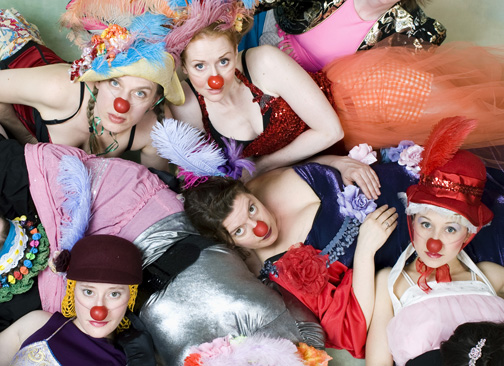Like a Frying Pan to the Head
Kendall Cornell ’86 and her clown troupe raise spirits and consciousness about women’s behavior.
 Some women use surgery to change their appearance as they struggle with society’s expectations of how it thinks they should look or behave. As creator and director of the all-female clown troupe Clowns Ex Machina, Kendall Cornell often just uses a red foam rubber nose. In fact, she finds amusement in playing off those expectations to create theatrical clown stories most audience members never see coming.
Some women use surgery to change their appearance as they struggle with society’s expectations of how it thinks they should look or behave. As creator and director of the all-female clown troupe Clowns Ex Machina, Kendall Cornell often just uses a red foam rubber nose. In fact, she finds amusement in playing off those expectations to create theatrical clown stories most audience members never see coming.
Working with the female clowns is “phenomenal,” says Cornell, from her West Village apartment in New York City. “The minute the women come on stage, the audience is blown over. The clowns have such a life force, and the women are all different sizes. We don’t see women like that much. Usually, women are portrayed as caricatures. But this is raw vitality on stage. We arrive for a performance ready to have fun with the audience. Together, the troupe has an impact that is very strong.”
Cornell’s clowns are reminiscent of the comedic styles of Lucille Ball, Danny Kaye, and Guilietta Masina. Through research, Cornell has found that female characters don’t translate to the formulaic male comedy situations. But, she says, if you take away the men and the scenarios and it’s just the women, there are many more possibilities.
The troupe’s name, Clowns Ex Machina, is a play on the Greek theatrical term deus ex machina, which means a person, thing, or event that appears unexpectedly and impacts the storyline in an often larger-than-life or magical way. Cornell’s motivation for creating the ensemble in 2006 is similar. She wants the pieces she creates to have an unexpected impact on audiences’ expectations of women.
A recent example of this was performances of fairytales and Gothic romances with a twist, such as Cinderella. In this piece, Cinderella is primarily in love with shoes that don’t fit her, says Cornell. “She rejects each man who cannot get the shoe on her foot with a series of shoe puns and moves onto the next destined-to-fail suitor. In the end, she chops her own toes off,” Cornell says. “This piece is more about vanity.”
Cornell (center in photo) encourages her troupe to lose their inhibitions and find the funny in all emotions through improvisation, comic timing, imagination, and a variety of other skills. She offers the same principles to participants in her two-day, all-women clown workshops, which are open to the general public.
The moment in 1993 when Cornell realized that clowning was her calling is etched clearly in her psyche.
“I went to see a physical comedy workshop being taught by David Shiner, who was then on Broadway doing a show with Bill Irwin called Fool Moon. It was a silent comedy show except for music and was a huge Tony Award–winning hit. Seeing the workshop was like a frying pan to the head. I said, ‘I have to do this! I don’t know what this is, but I have to figure it out!’ I even started to cry. It was like a culmination of what I had been working toward,” she says.
Soon after her revelation, and throughout the 1990s, Cornell spent time studying clowning in Europe with Philippe Gaulier, considered the Western world’s foremost clown teacher. She also taught clowning and modern dance in Europe and New York. She continues to take acting and dance classes to keep in shapes for performing, and knits to relieve stress.
Cornell says her current troupe of 11 women, ranging in age from 30 to mid-50s, spends a lot of time laughing in rehearsals but the work is often emotional and exhausting. “You have to practice having a light spirit, being resilient and bouncing back, because clowns always bounce back. To be a great clown means to be a great actor,” Cornell says.
The numbers Cornell creates for herself and her troupe have an evocative sense. “People are transported. There’s a sophistication to what I’m doing,” she says. “It’s funny, and you can laugh, but there are a lot of layers and intellect.”
In addition to the ensemble shows, in 2006, Cornell created a “clown extravaganza” for a one-night Cirque du Soleil event. The troupe has often performed at La MaMa Experimental Theatre Club, in New York City, and will do so again in 2012.
Her Quaker heritage also informs her work. “I don’t know whether Quakers approve of clowns, but I sometimes consider how clowning relates to the space of silent worship,” Cornell says. “The space that a clown steps out of is a deep void. It’s similar to a Quaker meeting where, when you have something you want to say, it comes out of silence—to be shared with others. There’s a way a clown comes onto a stage and from that emptiness creates something to share.”
 Email This Page
Email This Page